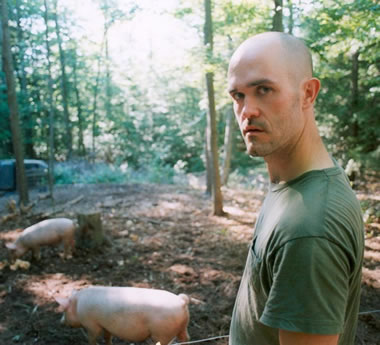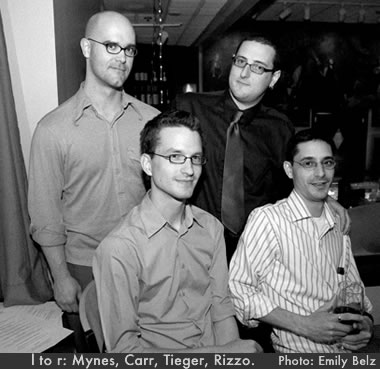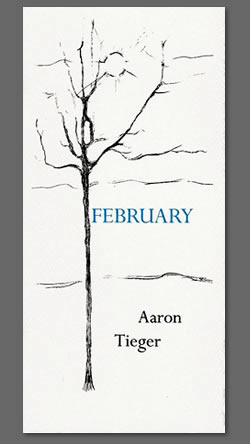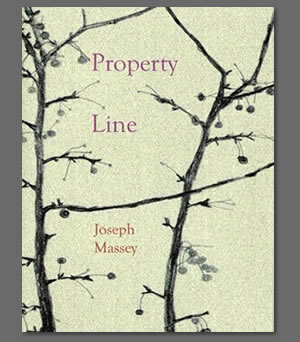
31 AUG 07
One of the first readings I did after case sensitive came out was in Wendell, MA, the ALL SMALL CAPS series curated by Jess Mynes. That was September 25th, 2006. I'd had the idea that for Every Other Day I would interview various poets who publish other poets or run a reading series, and Max and I drove up the day before the reading so I could interview Jess. We met him at the Deja Brew Pub in Wendell, where the ALL SMALL CAPS reading would be happening the following evening, and had a long cassette-taped conversation. In-person interviewing is more fun, but making the time to sit down and transcribe the tapes can be tough. Finally, though, here are the words in type.
:
a conversation with Jess Mynes

Let's start with an easy question: how long have you been writing poetry?
I guess, informally, since maybe my freshman year in college, and more seriously in the last five or six years. By "seriously" I mean being a little more active in attempting to publish it and engaging other writers. Developing the company of peers, so to speak.
Have you done an MFA and all that?
No. I never wanted to take a writing course. I didn't feel that was the way I wanted to pursue learning how to write poems. It was actually the exact opposite of what I wanted to do. Instead I studied literature and just wrote on my own. I thought the best way for me would be to read good stuff and also just to feel along. My writing is less analytically driven, more intuitively directed, so I felt pursuing it that way made more sense for my development, rather than trying to sit in a classroom and hash it out in workshops.
What was it that brought you to the desire to write poetry alonside the feeling that you didn't want to study how to do it?
Reading. Reading poetry. I felt that if I started taking it into a classroom setting at that point, I would fall into... I felt that in that setting I would write a type of poetry that was collectively sanctioned. We'd make poetry that was sanctioned by one another and our work would begin to resemble each other's. I had a sense of my own character and I knew it just wouldn't be right for me to try to develop my approach to poetry in that context.
And being in a classroom drains the life out of me. I find being in the garden, or in the woods, or walking down the street much more useful. The classroom works for some people and more power to them. But when I'm in a classroom I'm always thinking about what I'd like to be doing other than sitting in that classroom.
Where did you go to college?
I was an undergrad at St. Lawrence University, upstate New York. Canton, Potsdam area. Then I got a Masters of Library Science from University of Rhode Island.
Where did you grow up? How did you wind up living here?
I grew up in upstate New York. I spent a couple of summers in Boston when I was in college. After college, I moved to North Carolina for about a month, a very bad decision. I don't mean to badmouth North Carolina because there are some wonderful parts, but there's one not so great part where I happened to live. So I moved back to Boston again, lived there for a couple of years, but got tired of the city. Came out here with some friends, fell in love with the area. A good friend of mine bought a house just up the street here, I lived in his basement for a couple years. And I've been here since. I just really like this area: the combination of culture and the boondocks works for me. It's really beautiful here. It's also close to Boston. Close to New York.
Why did you become a librarian instead of a teacher?
I guess because I like having all of the benefits of being in the academy but I don't like playing by all the rules of the academy. As a librarian, you have an opportunity to work with students, to teach, and to turn people on to information--and about how to find information--but at the same time you don't have some of the obligations that you would as a professor. Also, though, you don't have some of those benefits--you have to work year round, things like that.
But it allows me to get my hands on pretty much anything that I want to, in terms of, say, finding a book by so and so that's been out of print and there were only 200 copies, that sort of thing. And I appreciate the whole ethos of librarianship: providing access for everyone, making information available to everybody. If that makes sense.
Sure. A while ago on your blog, you mentioned that somebody said to you, "Well, you're a librarian, you get to sit around and read all day."
[laughs] Yeah.
Just to clear that up, because librarians do different things--what do you do in your job?
Well, it's kind of unique because I'm in a hybrid position: I'm a cataloger and a reference librarian. As a cataloger, when stuff comes in, I process it for the individual library--which means I download and tweak the information. Essentially a cataloger organizes the information, providing access points so that people can find what they're looking for in a somewhat logical fashion. And the reference end is just the opposite: it's the outreach part, dealing with the public, teaching, collection maintenance, ordering books.
Being a librarian has a lot of responsibilities. You have to be technologically savvy, using the information in certain ways and being able to instruct people about how to use the information, and it's always kind of evolving. At the same time, as a cataloger you have this almost archaic, hierarchical organization structure that you have to learn well enough to let there be consistency from one library to another--so, say, a book in one library should have the exact same call number in one library as it would in any other library. That kind of thing.
You have a pretty active day, then. You're working--
From 7:30 to 3:30. I'm either at the reference desk, helping students, or I'm teaching, or I'm working in my office--
Tell me about the teaching part.
I'm the Humanities Liaison there. So I teach in all the art classes, all the upper level English classes, English 101, English 102, etc. Essentially there's a big push for information literacy--one of the requirements for students when they graduate from the college where I work is that they have to be information literate. Our big thing is to promote that information literacy, so when people find information they can evaluate it critically and use it more effectively.
So you've got a library gig that's unusual.
Yeah, that's what I love about it. It's both ends of the spectrum. I think when you talk to librarians, there's a certain stereotype of catalogers being very antisocial, you know, shrinking violets who don't necessarily want to engage the public. So to have a cataloger who is also in reference--though actually I think that's more the direction that things are going. More and more now, librarianship is about outreach and teaching, those kinds of things.
When did you start making books?
The first book that I made was Coltsfoot Insularity, collaborating with Aaron Tieger.
That was the first book you made? Wow, I had no idea.
So that was only about a year ago.
It's a beautiful book--I'm amazed it was your first.
Thanks. I appreciate that. For a little while I was talking about starting a magazine, but that didn't really satisfy what I wanted to do. So I decided to start a press. Aaron and I had this collaboration that we wanted to publish, but it was very difficult to find someone who'd be interested in publishing a collaboration. We decided to do it ourselves, and then I figured I'd take it on as my first project. But of course there were all these things that I didn't really think about. The fact that the manuscript was 50 pages long, for instance.
So we had to work out how we were going to do it. We couldn't just fold and staple it. Aaron helped me puzzle through it, as did Chris Rizzo and Michael Carr. All these guys, I kind of leaned on their knowledge. I decided to tape bind the book. Next was how we were going to do the cover. How would we get color on the cover? How are we gonna do this, how are we gonna do that?
I got big sheets, cut them down, then I had the idea of making a stamp and inking the stamp so I could stamp each book individually. I liked that idea of individually handling every book. Then as I started to develop that, I realized I could ink in different ways, I could have the inside of the leaf one color and the outside of the leaf another color.
How many copies did you make?
Just 150.
Even so, that's a lot to do that way. You did all the work yourself?
I did all the covers myself. I had the guts printed, and the binding done at the print shop. Chris's book and Joe Massey's book I did all myself except for the cuts. I printed them myself.

So you and Aaron and Chris and Michael--how was that connection made originally?
I went to a poetry reading of Aaron's in Amherst. Didn't know him at all.
Why did you go?
Because there were a couple of people I was interested in hearing, and I was just starting to want to attend more readings. I was attending some readings at Amherst Books. This was about three years ago, or somewhere in that neighborhood--my sense of time is really poor.
Things between you have really grown dramatically in a short time.
Yes. It has been a very quick arc.
I imagined that you and Aaron had been pals for 10 years or something.
No. It's three, maybe four. I went to this reading and I heard him read, then I emailed him and asked him some questions about the poems because I was interested in their architecture. I could hear them, but I wanted to see what they looked like, so I asked him if he would send me some of them. He sent some to me--eventually we started a correspondence. We had a lot of things in common. He's got a Library Science degree, I've got a Library Science degree. My girlfriend then had been an Ada Comstock Scholar at Smith, his girlfriend had been an Ada Comstock Scholar at Smith. Just all these weird little synchronicities. Then we finally met up and we just kind of hit it off. Then I found out that he did Carve. I sent him some poems and he liked the poems. And we kind of went from there.
Aaron had a reading at Michael Carr's house in Boston--I didn't know Michael. I went to the reading, met Michael, and we instantly started talking about Clark Coolidge and we were off and running. I met Chris Rizzo there because Chris had just released Aaron's Merge Point on Anchorite--I thought it was really beautiful and I told Chris that. Eventually Chris and I started to correspond, trading poems, that sort of thing--with Michael too. So it developed very organically.
How was Landscape Odes made? It has a really nice feel.
Thanks. I printed it on an inkjet printer. That's actually the same cover stock as Aaron's chapbook February.

And [laughing] in our rush to get it done before going off to Austin--I ordered the paper, because I wanted to see it, and then I was going to send it on to Aaron. I ordered the paper and it came in later than anticipated, so, in a panic, I also had them send it directly to Aaron. All of a sudden I had double the cardstock. I wanted to use some of that, so I printed that and folded it--and the dandelion on the front is a stamp.
It's handsome. I can tell it's not letterpress, but it does kind of give that feeling, maybe because of combining the stamp with the inkjet.
That's one thing I love about the stamps. You can get some color in there, you don't have to pay an arm and a leg for it, and it does have a different textural quality. And as I said, I love the idea of handling each book individually, so it's got that element. Also, because of the stamping, every book is going to be a little bit different.
Where are you making the books? Are you just doing it on the kitchen table or...?
It's funny you say that. Joe's book was printed in the kitchen--I was in the process of moving and I just set up the table in the kitchen and was printing in there. It has varied from project to project. Aaron's, he had a print shop near him that could do it. Actually it was really nice to have the poet standing there too. He could say, "Okay, that's exactly what I want." And with Michael's book, Platinum Blonde, we each did some printing at work and then we went to a print shop--but we printed the covers ourselves on an inkjet because that cardstock was really slick. We needed the right ink density. With Chris's and Joe's, I was strapped for cash so I did everything myself, except for the cuts. And then the cuts got screwed up. [laughs]

Joe's book, Property Line, has been complicated because we wanted to do the cover full bleed and I'd already bought the cover stock. Normally you're supposed to buy a larger size and cut it down--I had no idea. I bought the regular size. So then I had to have the covers cut separate from the guts. When I got them back, they'd cut the covers probably an eighth of an inch shorter than the guts. I just wanted to jump out the window. Then I took it to the print shop where I work, the print shop at Mt. Wachusett, and the guy there offered to help me out. He's gonna do a little cut that will shrink the margins just a bit, but they were pretty generous margins to begin with so I think it'll be okay.
I think Clark's will probably go through a print shop because that's going to be a larger run. And Brenda Iijima's will probably be some combination or permutation of all of those.

How do you feel about self-publishing versus being published by other people? And are you a poet with a full-length manuscript that's making the rounds, say, or are you just not into that?
Actually, I have a full-length manuscript that has been accepted by Skysill Press, a British press that is just starting up.
Hey, congratulations!
Thanks. It's exciting. The manuscript is about 114 pages long, poems that are written as responses to Rothko's paintings. There are a couple of them in String of Small Machines--
Right. And Matt [Henriksen] was telling me about them, that he took a bunch of them for Cannibal.
Yeah, he took 8 for Cannibal and there were some in Small Town.
But as far as self-publishing versus publishing elsewhere, I like the idea of doing a combination of the two. Some people view self-publishing as...maybe being a little on the vanity side of things? But I don't think that's necessarily true.
I don't see it that way.
There's a tradition of a lot of great poetry being published in that form. I like the idea of looking at my own poetry as a publisher. I also like seeing what other people come up with for my poems--their design choices. So it's fun to have a little bit of both.
How did you happen to get hooked up with this British press?
I put a couple of the poems up on my blog and Sam Ward, the editor, saw them and asked me if they were part of a manuscript.
He just wrote to you out of the blue.
I had corresponded with him a little bit before that--he'd expressed enthusiasm for some other work. Then he asked me about these, and I said, "Yeah, but it's a full-length manuscript. And even though they're short poems, ideally I'd like them one on a page." Obviously, I said we could work that out maybe, depending on what he had in mind. Eventually I heard through somebody else that he was interested in doing it as a full-length manuscript.
You heard through somebody else?
Yeah, yeah.
[laughter]
So then I finally sent him the manuscript and he wrote back and was very enthusiastic about it.
That's great.
And actually a lot of the chapbooks that I publish are smaller parts of larger manuscripts.
Sure. How did your press come by the name Fewer & Further?
Like most of my stuff, it's ripped off from somebody else.
[laughter]
It's time honored!
Exactly. I always really liked Zukofsky's title Barely & Widely. And for some reason--I often translate things in my head, and for some reason I translated barely and widely into fewer and further.
That's interesting. Are you doing one of those translation things at Konundrum Engine Literary Review? Have you been asked to do one?
No. I haven't heard about it.
You'd be a perfect person for this--judging from the way you seem to think. The first set is up right now--it's Zach Schomburg and Mathias Svalina. I'm going to do it with Bob Hicok.
The idea is: they ask two poets to trade poems and translate each other's poems, also writing a short piece about the process. I think you'd find it interesting.
Yeah. I'm always interested in collaboration. Aaron actually did something similar to that with some of my poems. It was a manuscript, Recently Clouds, we did that as--I don't want to say a sequel but...in the manner of Coltsfoot. And at one point he started "remixing" my poems. He called it remixing. It would be interesting to turn the tables and do some of his. That'd be fun.
Well, speaking of fun, is there something you'd rather do than be a librarian or is that your perfect job?
Oh, you know--ideally? If I could just sit around and write poetry all day...
But would that actually take care of the particular things that are taken care of by doing your current job?
I don't know. It probably couldn't pay the bills like this job does. [laughs]
Ah, the bills. Well...
No, I know what you're saying. I might find that certain needs weren't satisfied by that, by just writing, the way they are by my job now. But...I'd like to give it a shot!
Get that Guggenheim and just see how it works out for a year.
Yeah! I could try it. I'd like to find out.
I managed an organic farm for about four years. I really, really liked that. But it became financially...untenable. Ideally, if I could find some kind of combination where I was spending a lot of my time outside and also doing the writing and publishing, that would be the ultimate.
Yeah... That would be fantastic, I agree.
But, for now, librarianship is more than fine. I like it very much.
And now you write, you make books, you run a reading series, you travel to read your own work. Where do you see yourself with all that in two or three years, say? How would you characterize your ambition?
I try not to think in terms of any grander picture than...just wanting to keep writing, to meet cool folks, make connections, and have an opportunity to go forward. To collaborate with people, to publish someone's work or have someone publish mine, to make manuscripts together, those kinds of things. Doing that, I think the rest will just take care of itself. The idea would be to keep expanding that circle. I tend to be attracted to a small circle, one that gradually enlarges. It's really important to me to make connections--to have correspondences with people.
We went down to Austin, to AWP, for the Unassociated Garden Party. And it was great to connect up with folks that I'd been corresponding with and to then hang out with them. And the readings were great. But the actual events--for me, they were just kind of overwhelming.
You mean the official events?
Yes, and even many of the unofficial ones. There were people up on stage reading and people kind of wandering around talking. I guess my expectations were a little unrealistic. I expected everyone to be sitting there listening. Which [laughs] is ridiculous because they'd been just sitting around all day, listening. I think my orientation is to avoid those larger get-togethers, because that's often what ends up happening: the attention gets deflected from the poetry to something else.
A similar thing can seem to happen with publishing. If I keep things small, if that circle gets larger somewhat slowly, then the energy can stay focused on the work--better than if I try to reach out and hit something in the distance.
How does this fit in with blogging?
That's something I haven't been able to figure out. I think, for me, blogging is mostly this weird dialogue with myself about the importance of personality in terms of writing.
Tell me how you feel about that. It's a real bugaboo, right?
Yeah. I think I have a distrust of too much personality. In one sense, I find myself naturally wanting to make the blog into some sort of diary. That runs counter to the feeling about personality--or then I feel like I'm starting to develop a personality that is a presentation.
At the same time, I don't want the blog to be me expressing too many opinions about x, y, and z, because I'm not interested in creating a camp, or saying this is me, this is us, separated from everyone else. But I also want to support people, or draw attention to work that I enjoy. You know, the librarian element comes into it, like, "This is out there. Check this out. Do you know about this? Have a look at this." Ideally it could be a place where people could come--I know this is gonna sound cheesy--a blog could be a gateway to something else.
It doesn't sound cheesy to me.
It could be a place where people could come to find out about things they might miss otherwise. A "conduit"--maybe that sounds less pretentious than "gateway."
[laughter]
. . .